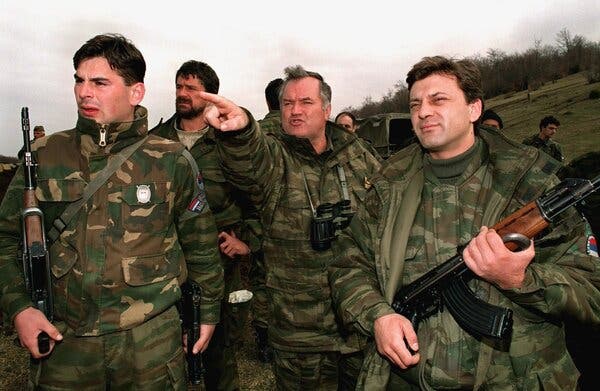Nothing to Change in Balkans after Srebrenica Massacre Ruling: Expert

“Nothing will change by his sentencing. Many nationalists on the Serbs side will continue to deny the genocide in Srebrenica,” Dr Neven Andjelic told IQNA after Mladic last week lost his appeal against a 2017 conviction for genocide, war crimes and crimes against humanity.
The UN court upheld the life sentence for his role in the killing of about 8,000 Bosnian Muslim (Bosniak) men and boys in Srebrenica in 1995.
The massacre, in an enclave supposed to be under UN protection, was the worst atrocity in Europe since World War Two.
Dr Neven Andjelic is an Assistant Professor in International Relations and Human Rights at Regent's University London.
Following is the text of the interview:
IQNA: What changes in the international judicial structure could indicate the recent IRMCT ruling on Ratko Mladic?
Andjelic: The original tribunal, the predecessor to the current structure, the International Criminal Tribunal for Former Yugoslavia, was established by the UN Security Council in 1993 when the war was at its peak because the international community had no trust in post-Yugoslav states and their national judiciary.
The crimes committed were obvious, but the criminals were celebrated in their nationalist communities. Hence the action by the UN and a precedent was created. There were unsuccessful attempts in the past. Courts in Leipzig and Istanbul after WWI did not bring justice; the Nuremberg and Tokyo trials after WWII were consequently described as "victors' justice", but the ICTY was the first attempt since to provide some form of justice before the international court.
It was followed a year later by establishing a "twin" tribunal for Rwanda, and the community of activists, experts and politicians gathered in 1998 in Rome to agree to conditions for setting up the international court. In 2002, the International Criminal Court was established in The Hague. This is the change that was brought by the processes and trials of Yugoslav war criminals. The sentencing of Mladic is probably the last decision of the IRMCT that was initially established because the ICTY had to be closed, and not all trials, perhaps some of the most important ones, were not finished.
IQNA: What was the position of Ratko Mladic among Serbian extremist nationalists?
Andjelic: Ratko Mladic did not personally involve in politics. He did not have time. Before the wars, he was an obscure career army officer. The transfer to Croatia changed this. He came under the public eye when his troops allegedly separated warring sides but were effectively protecting the Serb side and acted only when this side was likely on the losing end.
Mladic at the time was still a Yugoslav People's Army officer that claimed to be immune to nationalist calls. However, they sided with local Serbs in Croatia. With the conflict in Bosnia-Herzegovina, he was transferred to Sarajevo. He took over the command of the Bosnian Serbs army once the Yugoslav People's Army was officially transformed into the Bosnian Serbs' military.
Their military supremacy against the largely unprepared and undertrained, unequipped dominantly Muslim Bosnian army created an image of his military excellence that he obviously enjoyed. As such, many Serb nationalists claimed him as a hero and thus, he earned a status of a hero that he wanted and exploited while on the run from justice for more than 15 years.

IQNA: What role did Ratko Mladic play in the massacre of Bosnian Muslims?
Andjelic: He was found guilty for 10 out of 11 crimes the prosecutor accused him of. The scale of the massacre of Srebrenica men, which was judged to be a genocide, is such that it was impossible to be carried out by some lower-ranked officers and smaller units. It was an industrious action that required enormous logistics and collaboration of various large units.
Therefore, it had to be planned, prepared, ordered and carried by the large group of military units under the command of the highest-ranking generals. Even if it was not his idea, even if he personally did not pull the trigger, Mladic already proved his reputation, and he was in a position where nothing on such scale could have happened without his order.
IQNA: What do you think will be the future of the Balkans given the fate of Ratko Mladic?
Andjelic: Nothing will change by his sentencing. Many nationalists on the Serbs side will continue to deny the genocide in Srebrenica. Society is deeply politically divided. Mind you, it is a rather safe country, and the violent rhetorics never translates into the actual actions.
Families of the victims have some sense of closure by this sentence, but the dead remain dead. As long as the three sets of nationalists rule Bosnia-Herzegovina – Serbs, Croats and Bosniaks, no event could change anything in this country.
Interview by Mohammad Hassan Goodarzi



